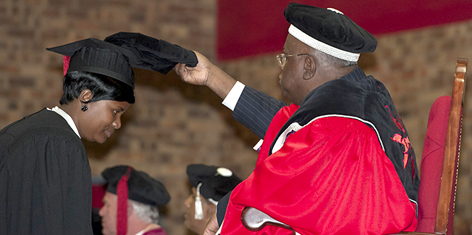Latest News Archive
Please select Category, Year, and then Month to display items
25 March 2024
|
Story Anthony Mthembu
|
Photo Lutendo Mabata
 Prof Nompumelelo Zondi, the newly appointed Vice-Dean: Research and Postgraduate Studies in the Faculty of The Humanities at the University of the Free State (UFS).
Prof Nompumelelo Zondi, the newly appointed Vice-Dean: Research and Postgraduate Studies in the Faculty of The Humanities at the University of the Free State (UFS).
Prof Nompumelelo Zondi has been appointed as Vice-Dean: Research and Postgraduate Studies in the Faculty of The Humanities at the University of the Free State (UFS). Prof Zondi assumed this new role on 1 March 2024 after serving as the Head of Department for African Languages at the University of Pretoria for seven years. “I consider this appointment as an opportunity of growth and learning more about higher education and the Faculty of The Humanities at large,” she said.
Prof Zondi indicates that part of her role is to spearhead the UFS Vision130 within the Faculty of The Humanities, and to ensure that the faculty assists the institution in becoming research-led, student-centred, and globally impactful.
Motivation for assuming this role
One of the primary reasons that led her to consider this role is sharing the knowledge she acquired as part of the Fulbright South African Research Scholar Programme. As a result of that experience and exposure, which went beyond the Ohio State University, she felt it befitting to implement some of the insights she acquired on a bigger scale. Therefore, even though she was impactful in her previous role, Prof Zondi believes that this is an exceptional and more desirable platform to do so. “I feel that I will have easier access to departments within the faculty, while also encouraging and supporting interdepartmental and faculty collaborations,” she explained.
A significant component of Vision 130
He believes that the elements that make up Vision 130 are interrelated. While she considers research central to Vision 130 – as she begins her journey at the UFS, she feels students deserve to be nurtured to further contribute to the university’s impactful research. Thus, student-centredness is the way to go. “I believe that students must be major role players in this Vision130; we must include them in the interactions and discussions that are part of the university’s strategic plan as well as in decision-making processes,” she said. As such, according to Prof Zondi, the more the faculty and the institution care for the students and involve them in Vision130 and in collaborations, the more research outputs the university will achieve.
Qwaqwa Campus honours academic excellence
2014-05-21
 Photo: Sonia Small (Kaleidoscope Studios)
Photo: Sonia Small (Kaleidoscope Studios)
Photo Gallery
Our Qwaqwa Campus was this past weekend a hive of activity when graduates, their parents and well-wishers descended on the campus to honour outstanding academic excellence during the Winter Graduation ceremonies.
On Friday graduates from the Faculty of Humanities, as well as the Faculty of Economic and Management Sciences, were addressed by Tommy Makhatho, Managing Director of the Qwaqwa-based Bibi Cash and Carry.
Makhatho urged graduates to continue working hard way beyond their graduation day and to dream big.
“Dream big and don’t let your poor background hold you back,” Makhatho said.
“Don’t let people say you can’t or that you will fail. Take up one idea. Make that one idea your life, think of it, dream of it, live on that idea, let your brain, muscle, nerves and every part of your body be full of that idea and leave every other idea alone. This is the way to success. If you don’t build your dream, someone else will hire you to help them build theirs,” said Makhatho, the winner of the 2013 Sanlam/Business Partners Entrepreneur of the Year and Job Creator of the Year awards.
On Saturday, graduates were treated to yet another moving message by eNCA’s news anchor, Mabale Moloi, herself a graduate in Biological sciences.
“If there is one ability that we should all practice on a daily basis, it is work ethics. This is a value based on hard work and diligence,” Moloi said.
Moloi further shared her views on what makes excellent work ethics.
“There are five very important factors of work ethics that we all need to be aware of. One of them is reliability. This means how committed you are to completing a task that is given to you within a particular period of time,” said Moloi.
“The second one is dedication. This means how prepared you are to go the extra mile in completing a job or your studies. Thirdly, one’s level of productivity is very important in having an excellent work ethic. This refers to giving the best of yourself, even to the extent of surpassing what is expected of you.”
“Fourthly, there is co-operation. We all must understand the value of team work and how it leads to success. And this, when paired with character, self-discipline and strong personality, will distinguish you from anyone else,” Moloi added.
Among the more than 800 degrees, diplomas and certificates conferred, were three PhDs in Physics, Polymer Science and Zoology, respectively. Four Masters of Science degrees were conferred cum laude.